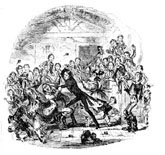
How Cowardice, the Herd Mind & Twitter Mobs Threaten Academia
A CONVERSATION ABOUT THE CLANNISH INQUISITION
Tweed jackets, overdue library books, and chalk dust. This is the image of academia in the popular mind. The reality, though, is that cutthroat careerists stalk the halls of American universities. Scholarship is not the business of the professoriate. Rather, getting promotions and prestigious prizes and staying one step ahead of the woke mob are what drive the life of the mind today. Or maybe the life of the mindless is a more apt description.
J. Mark Ramseyer and Jason M. Morgan have been battling the lemming-like woke conformists in the Asian Studies wing of American academia for years. In this taidan, or stage-conversation, Ramseyer and Morgan relate some recent scenes from the long struggle session that university work has become.
J. Mark Ramseyer: This is my first taidan in English, but I’ve read and done my fair share in the taidan’s native country.
Jason M. Morgan: And your native country, too! Well, almost. You were born in the United States but traveled to Japan as an infant and stayed there until returning for college, correct?
Ramseyer: That’s right. My parents were Mennonite missionaries. I grew up mainly in Miyazaki, in southern Japan, and then earned my undergraduate degree at Goshen College, a Mennonite-affiliated school in Indiana.
Morgan: I know where you went to college because one of the people who has been waging a Twitter war against you these past three-plus years made fun of you for going there. She’s an American academic and boasts of her and her colleagues’ big-name degrees: Ivy League, Northwestern, UCLA. Your alma mater — and mine, too, the University of Tennessee at Chattanooga — is a point of ridicule to academic Twitter mobs.
You May Also Enjoy
Every technological development, at least up until now, has created a new tool that can be pressed into the service (or disservice) of man.
A Catholic college, employing the vague and undefined empty vessel of "diversity," is willingly suppressing its own Catholic culture in favor of an infection with Western sexual obsessions.
If it's offensive to print Cleveland Indians, then it's even more offensive to make reference to the state of Indiana.

